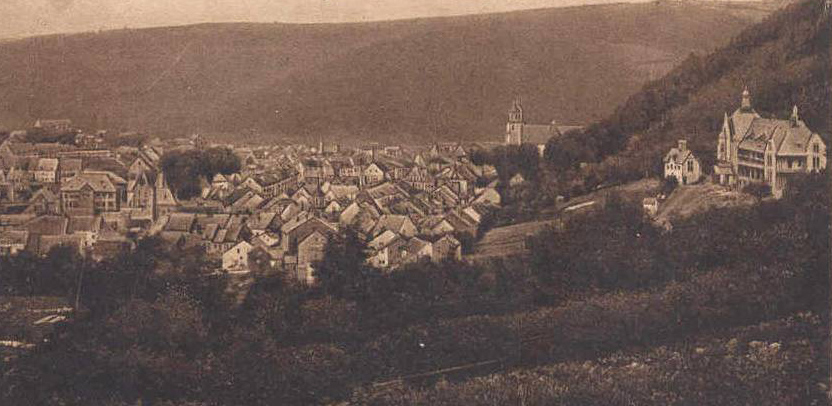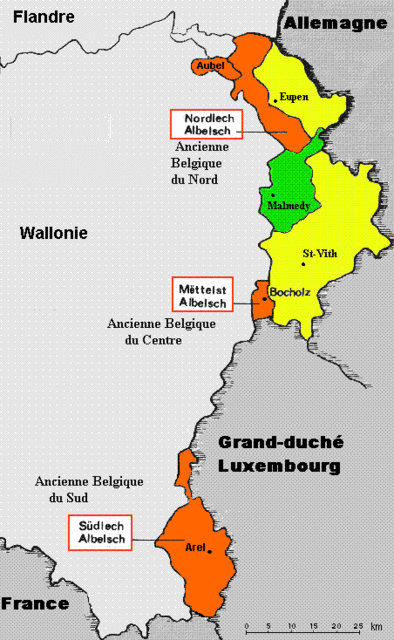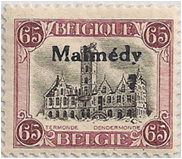ALBUM – View my Belgian Occupation of Malmedy album
Fast Facts
Region: Western Europe
Group: Post WW1 Occupations
Classification: Military Occupation
Prior Regime: Belgian Occupation of Eupen and Malmedy
Key Dates:
1918 – British occupy Eupen and Malmedy
1919, Jun 28 – Eupen & Malmedy ceded to Belgium under Treaty of Versailles
1920, Jan 26-Jul 23 – “Plebiscite” held on whether to return territories to Germany
1920, Sept 20 – Eupen, Malmedy and Sankt-Vith annexed by Belgium
1925 – Eupen, Malmedy and Sankt-Vith fully incorporated into Belgium
Following Regime: Belgium
Scott Catalogue: (Germany, Occupations) 1N41-1N58, 1NJ6-1NJ10
Pick Catalogue: none
Currency: 100 centimes = 1 Belgian Franc
History

At the beginning of World War I, most of the inhabitants of the Malmedy considered themselves German and fought for the German Empire during the war. As World War I began to draw to close, the Allies conducted negotiations regarding the breakup of the German Empire, and allocation of territories among the victors. The French government was a strong advocate for the expansion of Belgium and supported their claim to reunite the “lost” cantons of Eupen, Malmedy and Sankt Vith to Belgium. This was ratified in 1920 in the Treaty of Versailles and they went to Belgium on a provisional basis. The five year transition was to include a plebiscite (or vote) by the residents on whether they would remain as a part of Belgium.
 The plebiscite was held between 26 Jan and 23 Jul, 1920. However it was not a secret ballot and inhabitants of the cantons who objected to the annexation had to register (by name) at the village hall. This procedure led to mass intimidation; people were led to believe that anyone objecting to annexation by Belgium would not receive Belgian nationality, but be deported to Germany or at least have their food ration cards taken away. As a result, only 271 people out of 33,726 voted for the region to return to Germany. In 1925, Eupen, Malmedy, and Sankt Vith, fully became part of Belgium.
The plebiscite was held between 26 Jan and 23 Jul, 1920. However it was not a secret ballot and inhabitants of the cantons who objected to the annexation had to register (by name) at the village hall. This procedure led to mass intimidation; people were led to believe that anyone objecting to annexation by Belgium would not receive Belgian nationality, but be deported to Germany or at least have their food ration cards taken away. As a result, only 271 people out of 33,726 voted for the region to return to Germany. In 1925, Eupen, Malmedy, and Sankt Vith, fully became part of Belgium.
The very next year, in 1926, Belgium and the German Weimar Republic held secret meetings to discuss the return of the East Cantons to Germany in return for 200 million gold marks. When the talks were discovered, this infuriated the French, and talks were quickly concluded with no agreement.
In 1940 as World War 2 was ramping up, Nazi Germany occupied and annexed the East Cantons back into Germany. Many of the German speaking inhabitants supported the move; however that support dropped significantly when the German Army conscripted most of the male population into the military and most were sent to the Eastern Front. After the war, Belgium reclaimed their sovereignty over the region.
Stamps
 ALBUM
ALBUM
On 15 Jan, 1920, within the Eastern Cantons, a series of seven Belgian stamps were overprinted “Eupen & Malmedy” and surcharged in German currency.
These stamps were replaced on 20 Mar, 1920, with 14 stamps of Belgium overprinted “Malmedy”, but not surcharged in German currency. All of the stamps were surcharged in black. In 1921, 3 additional stamps (3c, 25c and 65c) were issued with the same overprint. Also in 1920, 5 Belgian Postage Due stamps were also overprinted “Malmedy” and issued.
These stamps were replaced with Belgian regular issues.
Banknotes
Belgian currency was used.
Links
Eupen – Malmedy at Wikipedia
Eupen and Malmedy at Belgium Stamps




